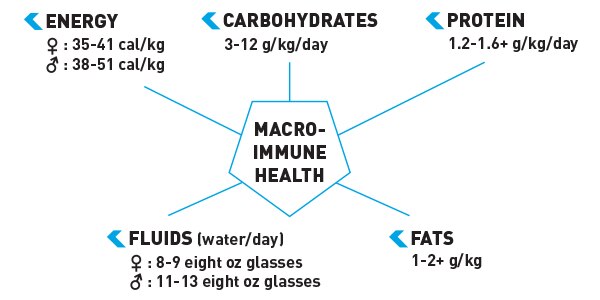Exercise and Nutritional Immunology. A Three-Part Series: Part 1: Macro Immune Health
Created by Karlyn Grimes, MS RD LDN CSSD+
(biography click here)
It’s pretty simple: the healthier an athlete, the more they can train. This means focusing on proper nutrition to support your entire body, including your immune system. Intensified training, low energy and macro- and micronutrient availability, psychological stress, sleep disruption, and suboptimal recovery can all affect the immune system. To help keep the immune system in tip-top shape, this three-part series will outline immune-supportive rules to live by, including key macro- (carbs, protein, fat and fluids) and micronutrient (vitamin and minerals) recommendations, guidelines for immune-friendly nutritional supplements, and a handful of general lifestyle habits.
Let’s start with the macronutrient basics…
KLEAN MACRONUTRIENT IMMUNE HEALTH GUIDELINES
Calories
Consuming adequate calories is critical to properly feeding an athlete’s immune cells. Female athletes need at least 35-41 calories per kilogram (kg) of body weight, while male athletes should aim for 38-51 calories/kg.
![]()
Carbohydrates
Carbohydrates (CHO) are the “GO” nutrient, providing immune cells with an immediate energy source, not to mention an equally superior fuel source for the muscles, brain and other key players on the human machine performance team. To ensure proper daily carb intake, consume 3-5 g/kg/day during low-intensity training, 5-7 g/kg/day during moderate intensity, and 8-12 g/kg during high-intensity or long-duration training. Additionally, ingestion of 30-60 grams CHO/hr during exercise has been shown to support healthy immune and stress responses in those exercising continuously for greater than 60-90 minutes. Carbohydrate-friendly options include unprocessed whole grain breads; cereals and pasta; brown or wild rice; veggies such as sweet potatoes, corn and peas; fresh fruits; low fat milk or yogurt; or simply add a scoop of Klean Recovery to the mix.
![]()
Protein
The importance of dietary protein (PRO) to immunity has been demonstrated repeatedly in research studies on athletes. Research has confirmed that protein balance can be preserved and the immune system can be supported by ingesting 1.2-1.6 g/kg/day of a variety of protein sources. First-rate options include lean meats and baked or grilled fish, eggs, low-fat dairy, beans, nuts and seeds, and whole grains. Athletes can also incorporate Klean Chocolate or Unflavored Isolate and/or Klean Essential Aminos +HMB to ensure their immune cells are restocked with the essential amino acids that are depleted during exercise.
![]()
Fat
To round out a well-balanced, immune-supportive diet, strive for 1.0-2.0 grams of FAT/kg/day. For ultra-endurance athletes, aim for the high side of this range and possibly push to 3.0 g/kg/day to ensure a good supply of intramuscular triglyceride fuel to go the distance. Fantastic fats include fatty fish such as salmon, mackerel, trout, tuna and anchovies; nuts and seeds, including their butters and oils; olives and olive oil; and avocadoes, to mention a few. Another option is to add a dose of Klean Omega to one’s daily routine to infuse the body with 750 milligrams of brain-friendly omega-3 fatty acids.
![]()
Hydration
Cortisol and epinephrine are two immune-suppressing hormones that rise during exercise, especially when volume and intensity escalate. Studies have found that maintaining adequate hydration can positively impact the immune system during exercise. Lightly active women should aim for 64-72 ounces a day, while men should reach for 88-104 ounces. Once the intensity and duration of training increase, fluid requirements follow. For athletes to optimally hydrate, they must first meet the basic hydration guidelines and then add 16-24 ounces of fluid for each pound lost during exercise. A simple solution: Klean Hydration and Klean Electrolytes to maximize fluid intake and minimize fluid loss. Bonus: Klean Hydration will give you a few extra carbs to pamper your immune team.
A Final Word…
A balanced diet that provides ample energy from carbs, protein and fat will keep immune defenses robust and optimize an athlete’s availability to train and compete. Aim to keep carb, protein and fat calories clean and unprocessed to ensure maximal intake of key vitamins and minerals. Stay tuned, as the second article in this series will explore some of the key micronutrients and nutritional supplements that are known to support the inner workings of the immune system.

Bio
Karlyn Grimes, MS RD LDN CSSD, is the founder of Simply Simple Health (SSH) and author of “The Everything Anti-Inflammation Diet Book.” SSH creates and administers nutrition, fitness and health education programs for athletes, educators, coaches and sports teams at schools and colleges throughout the Boston area. Its programming includes individual and group sports nutrition counseling, as well as sport-specific personal training. SSH also contributes to numerous academic textbooks and magazines.
Karlyn has a dual Master’s degree in nutrition and exercise physiology from Boston University and a Bachelor of Arts degree in biology from Colgate University, with a minor in economics. She is a registered dietitian (RD) with the Academy of Nutrition and Dietetics, a certified specialist in Sports Dietetics (CSSD) and a licensed dietitian nutritionist (LDN) in the state of Massachusetts. She is currently a faculty member in the Nutrition and Biology Departments at Simmons College in Boston, where she teaches sports nutrition, medical nutrition therapy, exercise physiology, anatomy and physiology, general biology, and numerous other courses.
+Karlyn Grimes, MS, RD, LDN, CSSD is a retained advisor for Klean Athlete.
Reference
- Palmowski, J., BoBlau, T.K., Ryl, L., Kruger, K., & Reichel, T. (2019). Managing Immune Health in Sports – A Practical Guide for Athletes and Coaches. German Journal of Sports Medicine, 70(10), 219.
